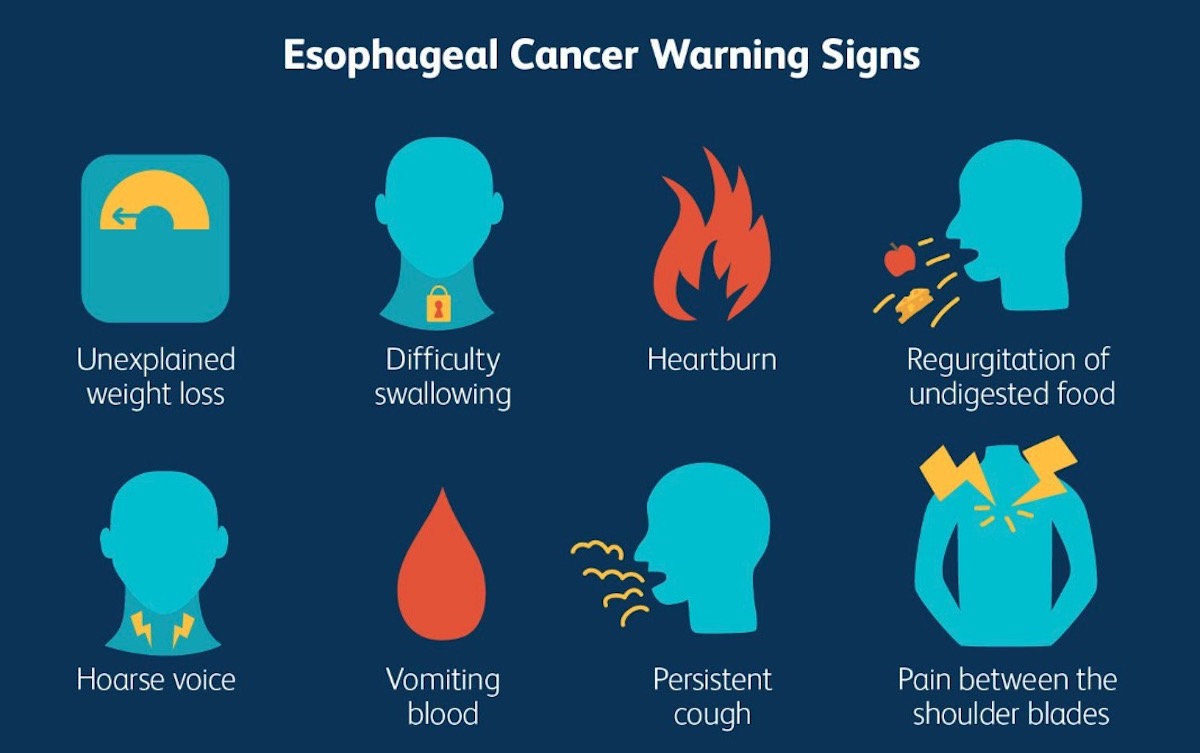Esophageal cancer is more likely in certain people. Older adults, especially over 55, are at a higher risk. Men tend to get this type of cancer more than women. If you smoke cigarettes or use tobacco, your risk goes up. The same is true for heavy drinkers, especially those who also smoke. Being overweight can also increase the risk because it can lead to acid reflux, where stomach acid damages the esophagus.

People who have had long-term acid reflux or GERD are at a higher risk, too. And if you have a condition called Barrett’s Esophagus, which is often caused by GERD, your chances of getting esophageal cancer are higher. It’s important to remember, though, that having these risk factors doesn’t guarantee you’ll get the disease; it just means your chances are increased.
Symptoms of Esophageal Cancer
Esophageal cancer can cause some specific symptoms, but two of the most common ones are trouble swallowing and unexplained weight loss. One of the first signs many people notice is difficulty swallowing. It might feel like your food is stuck in your throat or chest, or it might be hard to swallow without choking or coughing. Weight loss often happens because eating becomes difficult, so you might not eat as much or get enough nutrients. Other common symptoms include:
- Chest pain or discomfort
- A burning sensation behind the breastbone
- Hoarseness or a cough that doesn’t go away
- Indigestion or heartburn
- Vomiting
Are There Any Treatment Options?
Before starting treatment, doctors need to diagnose esophageal cancer. They do this using a combination of endoscopy, where a small camera examines the esophagus, biopsies, where tissue samples are taken, and imaging tests like CT scans to check for abnormalities.
When treating esophageal cancer, doctors usually consider a couple of common options. The two most common option are: surgery and radiation therapy. The first one is where the surgeon removes the part of the esophagus that has cancer. Sometimes, they also take out nearby lymph nodes or parts of other tissues around the cancer. With radiation therapy uses high-energy beams, like X-rays, to kill cancer cells. It’s often used along with chemotherapy, especially if surgery isn’t an option. Other treatment options include:
- Chemotherapy: using drugs to kill cancer cells.
- Targeted therapy: drugs that specifically target the cancer cells’ growth.
- Immunotherapy: boosting the body’s immune system to fight the cancer.
- Palliative care: treatments to reduce symptoms and improve quality of life, not necessarily to cure the cancer.
The choice of treatment depends on the stage of the cancer, the patient’s overall health, and other factors. These days, medical professionals have various ways to treat cancer, including the options mentioned above. Sometimes, doctors combine these treatments, but there may be cases where they are no longer effective, prompting consideration of other options. To stay informed about new treatments, it is crucial to conduct extensive online research. If you are diagnosed with esophageal cancer and unsatisfied with your treatment plan, seeking a second opinion from another hospital or oncology center is always a wise decision. Keep exploring to learn more about cancer, the stages of esophageal cancer, and its treatment options. Continue your search here:

